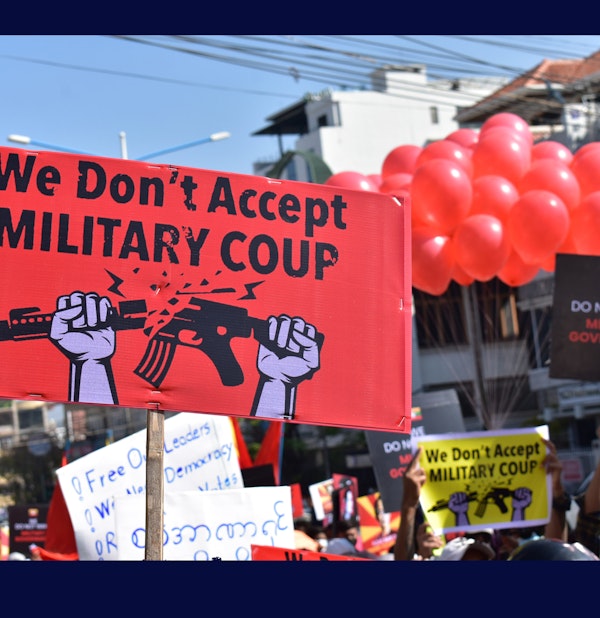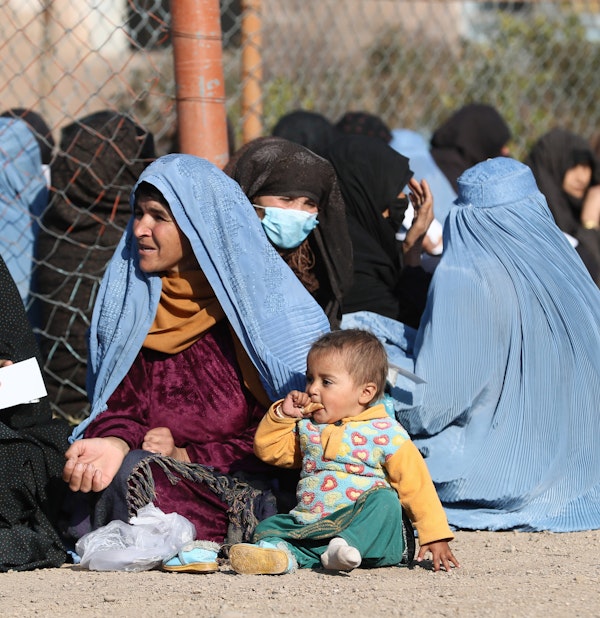Authoritarian Breadcrumbs Predated Russia’s Ukrainian Invasion
Russia’s invasion of Ukraine understandably has captured the world’s attention. But Vladimir Putin’s moves did not come without warning — and we can’t ignore other authoritarians on the move.
 Protesters take to the streets in Taunggyi, Burma, in February 2022 against the military coup. (R. Bociaga / Shutterstock)
Protesters take to the streets in Taunggyi, Burma, in February 2022 against the military coup. (R. Bociaga / Shutterstock)
It is almost conventional wisdom to say that Russia’s invasion of Ukraine marks a turning point in the next major conflict between liberal democracies and authoritarian regimes. But Russia’s aggression did not happen in a vacuum, even though it is a visible milestone. Vladimir Putin’s unjust and brutal invasion stands among an increasing but often ignored series of autocratic “breadcrumbs.”
For 16 years, Freedom House reports, the world has experienced a decline in freedom. In the last year alone, nearly 75% of the world’s population lived in a country that faced deterioration; only 20% live in countries rated as “free.”
Moreover, according to the latest analysis from the V-Dem Institute at Sweden’s University of Gothenburg, the levels of democracy that individuals enjoy around the world have deteriorated to 1989 levels.
While the rise of autocracies has gotten us to this point, the United States and other Western democracies cannot continue to discount how our own division, bias, and recent isolationist leanings have contributed to the current geopolitical standoff. Or the fact that autocrats have significantly exploited these factors to their benefit.
The United States and other Western democracies cannot continue to discount how our own division, bias, and recent isolationist leanings have contributed to the current geopolitical standoff. Or the fact that autocrats have significantly exploited these factors to their benefit.
Authoritarians like Russia’s Vladimir Putin and China’s Xi Jinping use crises to expand and fortify their power. COVID-19 provided a serious distraction to their abuses and atrocities over the last two years. But the examples speak for themselves – from China’s genocide of the Uyghurs to the worst crackdown of human rights inside Russia since the breakup of the USSR.
At the same time, the growth of isolationism and polarizing political rhetoric have stymied domestic support for U.S. leadership internationally. The U.S. response to Ukraine is perhaps the one exception – with strong support among Americans for U.S. sanctions and a hardline response to Putin. But disinterest in the hard work required to nurture the health of our own democracy – and even efforts to undermine it – has also empowered tyrants.
The Global North’s projection of a longstanding bias towards the Global South likewise has implications. Too often, we only pay attention when governments or others perpetrate injustices and violations of international law against populations who most closely reflect our own societies.
Additionally, policymakers do not always address the root causes of humanitarian crises, such as food insecurity. Unfortunately, the world is facing a record number of cases of acute food insecurity. The situation is made worse by the disruption in exports of wheat and other food products from Ukraine, a major agricultural producer. As we have seen too often, humanitarian crises can devastate a nation.
Moreover, the global community can be fickle in holding accountable regimes with little respect for basic freedoms and a society’s general well-being. Some policymakers have become more attuned to the importance of the needs for human security. But inconsistencies in holding recalcitrant regimes accountable further weaken the potential for democratic expansion.
An accumulation of authoritarian “breadcrumbs” demonstrates these truths worldwide. Consider these examples:
- Afghanistan has been described as the world’s worst humanitarian crisis. Ten months since the Taliban unjustly assumed control, the situation on the ground has deteriorated rapidly and unrelentingly. While circumstances like the drought and COVID-19 are contributing factors, the oppression and abuse of the Taliban have reinforced a “hell on earth” reality for millions of Afghans.
Most prominent is the Taliban’s archaic, oppressive, and misogynistic mandates to erase the status of women and girls in nearly every arena of public life. Women cannot work. Female students cannot attend school after the sixth grade. Women cannot travel without male escorts. They cannot leave their homes without a burqa. In some communities, they are barred from accessing markets, mosques, and, for the poorest women, public bath houses – a lifeline for basic hygiene amid widespread poverty.
The Taliban have also used the circumstances of women’s rights and girls’ education as a deranged bargaining chip with little response from the most visible democratic leaders in the world.
 Women and children await aid in Herat, Afghanistan, in February 2022. (Afad Tuncay / Shutterstock)
Women and children await aid in Herat, Afghanistan, in February 2022. (Afad Tuncay / Shutterstock)
- After Burma’s last election in February 2021, the country’s military staged a coup against the democratically elected National League for Democracy (NLD). Since then, the military has implemented a state of emergency to legitimize their violent and unjust crackdown on pro-democracy opposition groups.
The world denounced the situation as events first unfolded. But, over a year later, little has changed for the better. The military has detained, tried, and imprisoned prominent NLD figures for supposed crimes against the state. Even before the coup, the Burmese government’s treatment of the Rohynga was tantamount to genocide. Signs of real deterioration in the country were there – but the international community did little to help.
- Like Putin and Xi, leaders like El Salvador’s Nayib Bukele, Turkey’s Recep Tayyip Erdoğan, and Hungary’s Viktor Orban have worked quickly to silence critics, restrict personal freedoms, and fortify their influence. They have used controversial constitutional reforms with little objection from the global community.
- African countries have seen numerous coups play out over the last two years – from Burkina Faso and Chad to Guinea, Mali and Sudan – with serious abuses perpetrated against vulnerable populations, especially women and children. The atrocities committed in South Sudan and Ethiopia’s Tigray continue with global outcry at a fraction of the concern expressed for the situation in Ukraine.
These situations are but a small snapshot of the true scale of growing autocratic influence. Many of the loudest voices in the United States and Europe have stoked an increasingly populist and isolationist narrative in recent years. But the ferocity and growth of autocratic influence – demonstrated worldwide and not limited to the two big examples of Russia and China – cannot be ignored any longer.
Many of the loudest voices in the United States and Europe have stoked an increasingly populist and isolationist narrative in recent years. But the ferocity and growth of autocratic influence – demonstrated worldwide and not limited to the two big examples of Russia and China – cannot be ignored any longer.
For the sake of America’s own security and prosperity, it is in our interest to ensure an engaged presence in the world that prioritizes outreach and partnership with fellow democracies.
We must use our platform to lift up the voices and experiences of those who have been silenced. In doing so, we must meaningfully support those seeking to install foundational principles of accountability, transparency, good governance, and equity within their societies. We also must push back and impose consequences more aggressively on those engaged in gross human rights abuses and corruption through tools such as the Global Magnitsky Act.
Most important, we must consistently articulate the belief that the inherent dignity of all people matters. Too often, the West overlooks the misdeeds of rogue authorities. It may be convenient, but complacency only encourages bad actors. And eventually – as we have seen play out in so many instances across history – little fires can quickly become global catastrophes when left to smolder.
The Catalyst believes that ideas matter. We aim to stimulate debate on the most important issues of the day, featuring a range of arguments that are constructive, high-minded, and share our core values of freedom, opportunity, accountability, and compassion. To that end, we seek out ideas that may challenge us, and the authors’ views presented here are their own; The Catalyst does not endorse any particular policy, politician, or party.
-
Previous Article The Economic Impacts of the War in Ukraine Conversation with Gary Cohn, former Chief Economic Advisor to President Donald Trump and former Director of the National Economic Council
-
Next Article How Democracies Should Respond in a Post-Fact World Essay by Laura Thornton, Senior Fellow and Director at the Alliance for Securing Democracy at the German Marshall Fund.

